Jacob Coons
1800-1869
{Likeness Needed}
![]()
A Brief Sketch On The Life Of Elder Jacob Coon
Jacob Coons was born in Montgomery county, Ky., January 12th, 1800. His education was very limited, as was common to farmers' boys in these early days. He was baptized by Elder John Smith, in the fall of 1825. He told me he was the first person brother Smith ever baptized, upon a simple confession of faith, without relating a "Christian experience." He had, naturally, a large vein of religion running through his system, and he took part in the prayer meetings forthwith, and soon engaged in exhortation and preaching in the neighborhood.
In 1831, he and David Davis and Absalom Rice, all young preachers, came with their families, in the same group to Missouri, and settled in the same neighborhood, in Calloway county. Brother Coons, found himself surrounded by a large uncultivated field so far as our plea was concerned; and in the ardor of his first love for Christ, and his cause, he commenced his religious labors there. In a short time, by the aid of coadjutors, Davis and Rice, a church was constituted in Fulton, which was the first one in the county, I believe
Brother Coons remained there for 17 years, successfully preaching throughout the county, and beyond its borders; at the end of which time the cause had gotten a strong hold in all these parts. In 1848, he moved to Mexico, Audrain county, and preaching was the business of his life ever afterwards; a period of twenty-one years. He often visited churches at stated periods; far off and near, and when that was not the case, he was somewhere in the field in active service of the Master. Nothing but sickness or high waters, ever prevented him from meeting his appointments. No preacher that ever lived in that county, made such sacrifices or endured such hardships, in the discharge of his professional duties as brother Coons. None ever went through as much, and deep mud, snow and rain, as he. Besides he was subject to an infirmity of the body (Hernia) from early manhood, which would have caused almost any other man, to have succumbed, but he went bravely on, and was never heard to complain of it. That which, perhaps, contributed more to his usefulness, than any other element in his ministry, was his great zeal and fervency. In all his speeches those features were present, and prominent. He was a good recruiter, and his labors were abundantly blessed, as instruments in bringing souls to Christ. He never seemed so near to heaven, as in a successful meeting. Withal he was a fine singer, and loved to sing. His voice had not failed any at 69 years of age. He was a great student of his Bible. Long before his death, he made it a rule to read the Old Testament through once a year, and the New Testament once a month. He read little else than his Bible, and religious papers. In hospitality he was a model. He never was the man that turned off the stranger, but like Paul "received" and cheerfully "all that came in unto him." He died with the harness on. He had meeting at a private house on Lord's day, in his neighborhood, with one confession, and he attended to the baptism in the evening. Before night on the same day he was taken ill, and ere the sun arose next morning, was a corpse. His death occurred August 23d, 1869, in his 70th year.
-Early Missouri Preachers Vol. II, By T.P. Haley, (Original Title: Historical And Biographical Sketches Of The Early Churches And Pioneer Preachers Of The Christian Church In Missouri) Chapter XXXIII, Elder Jacob Coons, c.1888 pages 514-516
Note: See the write-up on the interaction between Jacob's wife, Matilda Jane Howe and her father, Joseph P. Howe. There is an excerpt concerning Coons' conversion, and ensuing discussions between Matilda and her father that is recorded in John Augustus Williams' biography of John Smith.
![]()
Elder Jacob Coons, Of Missouri.
This good man departed this life at his residence near Mexico, Audrain county, Missouri, the 23d day of August last, at a quarter past one o'clock, P.M., aged sixty-nine years, seven months and eleven days. His death took place on Monday. The day before, he preached, as usual in his neighborhood, at eleven A. M. He spoke with his accustomed vigor, earnestness and zeal, and seemed to have his wonted health. One hearer made the good confession, whom he baptized that evening at four o'clock. From the baptism he went home and early in the night was taken sick, severely sick, suddenly and without premonition, and died the next day as above stated, after a short but agonizing illness of about fifteen hours.
Victorious his fall, for he rose as he fell,
With Jesus, his Master, in glory to dwelling;
He has passed o'er the stream and has reached
the bright coast,
For he fell like a martyr—he died at his post.
Jacob Coons was born January 12, 1800, in Montgomery county, Kentucky. He was baptized by Elder John Smith, (deceased) at Spencer Meeting-house, the third Lord's day in May, 1826. It is an interesting historic fact that he was the first person ever baptized by Elder Smith upon the simple confession of his faith in the Christ. This dispensing with the relation of an experience as a condition precedent to baptism, at so early a day in Elder Smith's ministerial career, is a fact deserving honorable mention. Brother Coons often spoke of it as an event of his life to which he looked back both with pleasure and gratitude.
Shortly after his admission into the church, he was ordained by Brother Smith and others to the ministry—but precisely when and where the writer knows not. In 1831 he immigrated to Missouri, and located near Fulton, in Callaway county. Audrain county, in which he died, was then a part of Callaway. He was one of the original nine of which the Christian Church in Fulton was composed. The mother of the writer was another. The church was constituted in 1832.
How vividly, as it were but yesterday, rises up before me the Lord's day meetings of the faithful few. I was but a little boy then—eight or ten years of age. Joseph, my little brother, younger than I, was living then. Our mother took us regularly with her to church. These Bible alone people, in the main, were poor, very poor, in this world's goods. They met in the Court-house for worship. Eld. Joel H. Haden, T.M. Allen, M.P. Wills, Absalom Rice, and the brothers Joseph and Jacob Coons—now one, then another, sometimes several together, occupied the Judge's seat, improvised into a pulpit. How these Christians loved one another. How close to the Book those preachers clung. How simple, solemn and earnest their preaching was. It was pleasant to look upon this worshiping assembly. How sweet their warm simple singing, how ardent their prayers, how reverential their behavior in showing forth the Lord's death, how unostentatious and primitive their whole worship. And when the benediction was pronounced and the Christian assembly adjourned, how loth they were to break up. How they loved to linger about the door to talk with and encourage each other—holding sweet converse concerning the kingdom of God and the name of his Son Jesus Christ. And when they parted, as part they must, the tear in the eye indexed the heart-sadness for the separation, while, at the same time, the bright smile and sunny face reflected the wish and the hope, that they would meet again, if not here, then in the happy home beyond.
I well remember some of their baptismal occasions. One, especially, looms up, in all its distinctness, before me now. It was common in those days. It deserves to go to record as characteristic of the man and of the times. It is an interesting feature of the history of the doings of our immediate place in which to put it to record than in this biographic sketch of Eld. Jacob Coons—a frequent happy participant in those ceremonies. But to the baptismal scene. It was a bright and cold, but beautiful, and, for Missouri, has assembled for worship. The brothers Coons were there, also, Joseph exhorted.—Jacob led the singing. Four person had made the good confession. They were to be baptized that evening. In those days baptisms were not postponed to a more convenient season. The obedience immediately followed the public confession. Main Street descended gently front the Court-house to the beautiful stream of water that ran on two sides of the village. It was, perhaps, a quarter of a mile to the spot where the candidates were to be buried in baptism. The preachers, the candidates and the congregation assembled at an appointed hour at the Court-house. They then formed a procession and marched two and two along the street to the baptismal stream—the brothers Coons in the lead. As they emerged from the Court-house they struck up a song in which the entire procession joined. What strong, sonorous voices these brothers had. What wondrously charming music they made. How sweetly, as if the very breath of heaven, it rung out on the air of that Lord's eve. Except the song, a silence as of death prevailed. The voice of the scoffer, for once, was hushed. Grown up men, too, were fully under the solemn, wholesome spell of the hour. The crowd that gathered upon the street, from here and there, to witness the scene was deeply impressed, and in a grave and quiet manner followed to the water. I shall never forget the srtange(sic strange), peculiar song they sang as we stood on the bank of the stream. It was winter. Snow covered with its white mantle the face of the earth.—Ice, thick ice, covered the stream. A hole had been cut in it, for the burial of the candidates. It looked like a grave. To the unregenerate it had a cold uninviting look. Hitherto the impression on the spectators—the outsiders—had been deep and good. A reaction would be disastrous. Jacob Coons, as by intuition, took it all in at a glance. A crisis had come. He was grandly equal to the occasion. He struck up an old-fashioned song that came, as if by inspiration, to complement the ceremony, amid the peculiar surroundings at the time. I had never heard it before—few in the audience had. I have never heard it since. I only remember one couplet and a stanza of a song. They were these:
"if your hearts are only warm
Ice and snow will do no harm."
And again:
"We want no cowards in our band,
Who'll their profession fly:
We call for valiant-hearted men,
Who do not fear to die."
The effect was electric. Not a candidate flinched. A prettier baptismal administration I never witnessed.—Bro. Wills was the baptist. The impression on the crowd was deepened rather than lessened. The little flock was built up in the faith. The good cause was advanced and the little church has since greatly increased in numbers and popularity. It is to be hoped that its growth in knowledge and grace has been equal to its increase in numerical strength.
From my early boyhood I knew and loved Jacob Coons. Those who knew him best loved him most. He was no scholar—no orator; he had, indeed, but little education. But he had a Bible—he dearly loved it. He read it daily and studies it well. He thoroughly understood the New Testament scheme of redemption, devoted his life to the proclamation of the gospel, and did it, for the most part, without the hope of earthly fee or reward. He was eminently successful as a preacher. His sermons, totally void of literary culture and finish, delivered in the current language of the common people, made an impression upon the minds and hearts of hearers that a more scholarly address would have failed to reach, and thousands, under his preaching, made the good confession. Except the venerable and beloved T.M. Allen, still actively engaged in preaching, perhaps no preacher among us, in Missourit, has baptized so many persons as he.
His piety was uniform, deep and cheerful. He loved to read the Scriptures, he loved to preach, to exhort sinners, to encourage his brethren. He was a man of prayer. Singing the songs of Zion was his special delight—and he sang them well. At home and at the church it was a blissful service. He loved the old-familiar songs—the songs of our childhood and earlier worship—the simple, sweet songs, so full of religion, that characterized the worship in the family and the great congregation in the long, long ago, before religion had degenerated into music and aesthetics, and high-culture in singing had taken the place of piety and devotion. Some of the most successful protracted meetings of my life have been those in which he conducted the singing. Fond memory clusters still about those meetings, as bright, sacred scenes and events, from which, after the lapse of years, the heart refuses to be divorced. Jacob Coons belonged to that generation, rapidly passing away, of humble, self-sacrificing, God-fearing men and preachers, that were identified with our reformatory movement from the beginning. With a step that was steady and a heart that never quailed—with an unflinching faith and with a zeal according to knowledge, he fought the battle through, died with his harness on, and has gone to his reward.
In conclusion, it affords me pleasure to say, from a long and most intimate acquaintance with him, that the one Book which he so carefully read and diligently studied, through its hallowed influence over his heart and life, over all he said, over all he did. He was truly a man of God, and a faithful minister of the gospel. He was, to the last, for the Bible and the Bible alone—its unadulterated gospel, its inspired language, its simple worship, its faith and its obedience—no more, no less. All honor to his memory for this. Pure in speech, sound in the faith and godly in his life, gave themselves in early youth to the Savior, and all of them, without exception, are in the church that he loved, and walking in the commandments of the Savior whom he worshiped and adored. He was a man to be loved for his exemplary piety and for his illustrious work in the vineyard of his Master. It is devoutly to be wished that those of us on whom the mantle of this good man and his co-laborers have fallen, may do our work as faithfully and as well as they.
-H
-The Apostolic Times, September 23, 1869, page 188.
Note: It is uncertain as to the identity of "H" Perhaps, "H" is T.P. Haley.
![]()
Directions To The Grave Of Jacob Coons
Jacob and Matilda Coons is buried in the Old Village Cemetery in the city of Mexico, Missouri. The Cemetery is at the corner of Western and Whitley on the Westside and Olive and Whitley on the East side in Mexico, MO. It readily appears that most of the graves in this cemetery were destroyed over time. Markers that were able to be found were taken and put in a wall to preserve what markers could be preserved. One of these was that of Jacob Coons.
GPS Location
39°10'34.2"N 91°53'11.4"W
or D.d. 39.176159, -91.886486
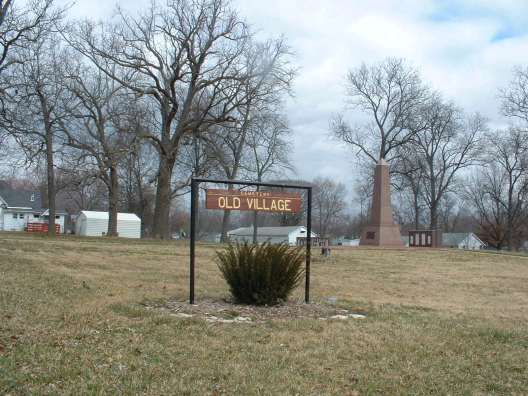
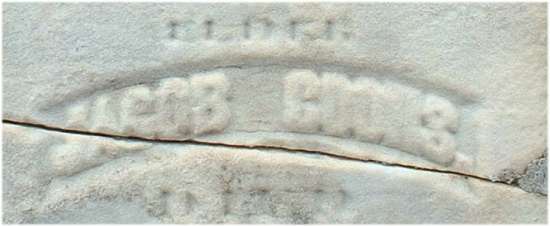
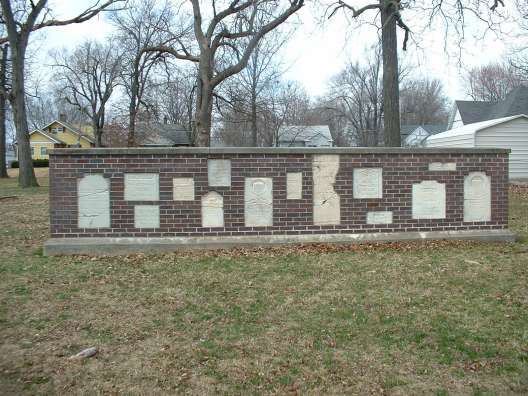
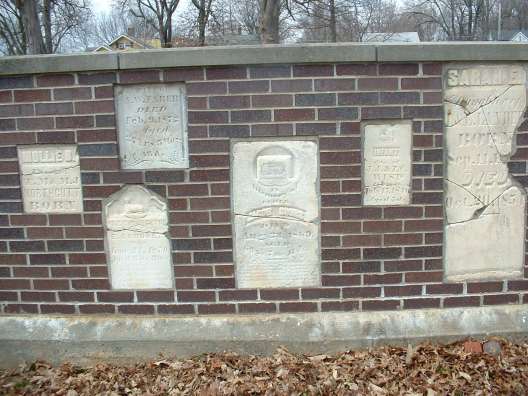
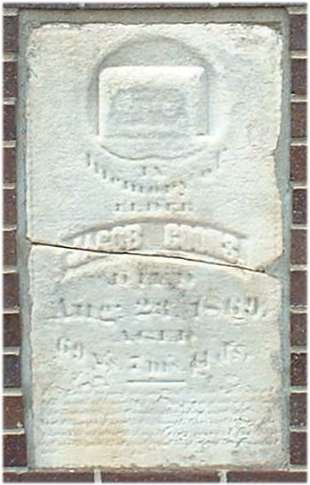
In
Memory of
Elder
Jacob Coons
Died
August 23, 1869
Aged
69 yrs, 7 ms. 11 ds.
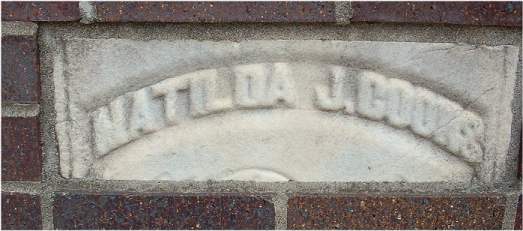
Matilda Jane Howe Coons, wife Of Jacob Coons
See Williams' article on Matilda's conversion here.Webmaster's Note: Special thanks are
extended to Wesley Snyder, a Christian who lives in Mexico, Missouri, for
providing much of the information and pictures made available on this
webpage. Wesley also help provide information on J.A.
Meng. See his site here.
![]()